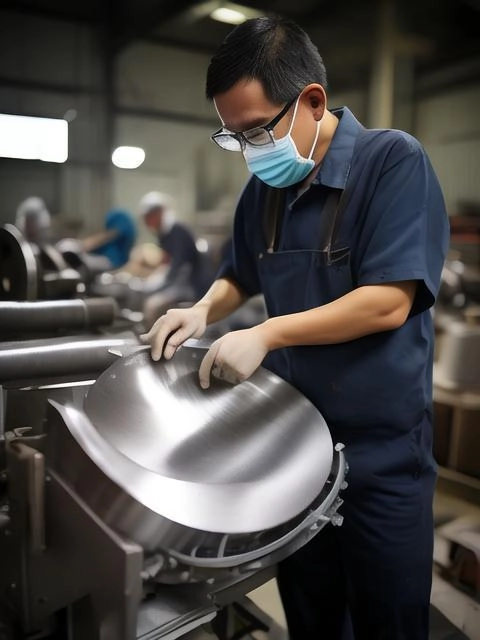JSTインダストリー
さまざまな素材の加工サービスを提供
CNC加工材料紹介
CNC加工(コンピュータ数値制御加工)は、コンピュータプログラムによって工作機械の軌道を制御することで、高精度・高効率を実現する自動加工技術である。現代の製造業において、CNCマシニングマテリアルは複雑な部品の大量生産のニーズに応えることができるため、必要不可欠な製造手段となっている。しかし、CNC加工の品質と効率は、選択された材料に大きく左右される。

材料の選択はCNC加工にとって非常に重要であり、機能性、耐久性、費用対効果、そして最終的には市場における製品の競争力に直結します。正しい材料選択は、スムーズな加工プロセスを保証し、生産不良やスクラップ率を減らし、製品の性能や寿命を向上させます。例えば、アルミニウム合金は軽量で機械的特性に優れているため、航空宇宙や自動車製造によく使用され、ステンレス鋼は耐食性に優れているため、化学薬品や医療機器に広く使用されています。
さらに、硬度、耐熱温度、耐摩耗性、熱処理特性などの材料の物理化学的特性も、CNC加工を行う際に考慮すべき要素である。異なる材料特性は、切削速度、工具の選択、加工中の冷却方法に対する特定の要件を決定する。したがって、様々な材料の特性を深く理解することは、CNC加工プロセスを最適化し、製品の品質を向上させるために重要である。
JSTインダストリーでは、包括的なCNC機械加工サービスを提供しており、材料加工において豊富な経験を持っています。私たちは、お客様の製品が経済的かつ効率的に製造されるよう、専門的な材料選択のアドバイスや加工ソリューションを提供するために、設計段階で当社のエンジニアとコミュニケーションをとることをお客様にお勧めしています。入念な材料選定と精密なCNC加工により、お客様の製品が市場で際立つようお手伝いいたします。

CNC合金加工

CNCプラスチック加工

CNCアルミ加工

CNCステンレス加工

CNC真鍮加工
CNC加工材料の比較
機械加工業界では、異なる材料は、そのユニークな物理的および化学的特性により、CNC加工中に異なる加工特性とアプリケーションを示します。以下は、アルミニウム、ステンレス鋼、真鍮、合金、プラスチックのCNC加工における違いとバリエーションの詳細な比較です:

アルミニウム
軽量だ: アルミニウム合金は密度が低いため、航空宇宙や自動車製造など、軽量化が求められる用途で人気がある。
高い熱伝導性: アルミニウム合金は熱伝導性に優れているため、ラジエーターや熱交換器など、熱を素早く放出する必要がある部品に最適です。
機械加工性: アルミニウム合金は切削加工や成形が容易だが、CNC加工では多くの熱が発生するため、歪みが生じないように入念な冷却が必要だ。

ステンレス鋼
耐食性: ステンレス鋼は耐食性、耐酸化性に優れているため、化学、医療、食品加工など、衛生基準の高い用途に適しています。
強さだ: ステンレス鋼は高い強度と硬度を持ち、高荷重や高応力を受ける環境で優れた性能を発揮します。
加工の難易度 ステンレス鋼の加工は比較的難しく、より耐摩耗性の高い切削工具を使用する必要があり、加工工程では冷却と潤滑がより重要になる。

真鍮
機械的特性: 黄銅は、高い強度と優れた冷間加工特性など、優れた機械的特性を備えている。
美学: 真鍮は独特の金色の外観を持ち、装飾部品や良好な導電性を必要とする用途によく使用される。
加工特性: 真鍮は、CNC加工時の切削速度がアルミニウム合金よりも遅いが、それでも良好な加工性を維持している。

合金(アロイ)
用途に応じた利点: その組成と比率によって、異なる合金は高強度、靭性、高温への耐性といった異なる特性を示す。
汎用性がある: 合金には様々な材料があり、特定の用途のニーズに合わせてカスタマイズすることができる。
加工に必要な条件: 合金のCNC加工には、その硬度や熱処理特性に対応するための特別な工具や加工パラメータが必要になる場合があります。

プラスチック
汎用性がある: プラスチックには、汎用プラスチックからエンジニアリング・プラスチックまであり、それぞれにユニークな特性と用途がある。
費用対効果が高い: プラスチックは一般に低コストで、コスト重視の用途では大量生産が容易である。
加工のしやすさ: プラスチックのCNC加工は比較的簡単で、金属のような高い切削力を必要としないが、加工中の熱変形を防ぐために注意を払う必要がある。
サービスフィードバック
エミリー・トンプソン - 素材選択と費用対効果
「JSTインダストリーが提供するCNC加工サービスには非常に満足しています。JSTインダストリーの専門家チームは、材料選定に大いに役立ち、性能要件を満たし、かつ費用対効果の高い材料を見つけることができました。特に、アルミニウム合金とステンレス鋼の選択について徹底的な分析を提供してくれたおかげで、製品の軽量化と耐腐食性を維持しながら、コストを効果的に抑えることができました。プロセスを通して、JSTインダストリーが示したプロ意識と顧客ニーズへの配慮に感銘を受けました。"
アリ・アル=ファハド - 設計最適化と加工精度
「設計の初期段階では、CNC加工では製品精度に対する厳しい要求に応えられないのではないかと懸念していました。しかし、JSTインダストリーの精密加工技術と入念な設計最適化提案により、私たちの懸念は完全に払拭されました。その加工公差は非常に精密に管理されており、最終製品のサイズと品質は私たちの期待をはるかに上回るものでした。さらに、加工コストを削減するための彼らの設計提案は非常に実用的で、製品設計を最適化し、全体的なコストを削減する上で重要な役割を果たしました。"
イヴァン・ペトロフ - 表面加工と品質管理
「JSTインダストリーは、CNC加工後の表面仕上げで素晴らしい仕事をしてくれました。当社の製品は繊細な表面品質が要求されますが、彼らは幅広い表面仕上げオプションを提供するだけでなく、すべての工程で高い水準と一貫性を確保しています。バリ取りから最終的な表面コーティングに至るまで、すべての工程で厳しい品質管理が行われ、その結果、当社の品質基準を十分に満たした、バリのない滑らかな表面を持つ部品が納品されるのです"
ミスター・ハン - カスタマーサービス&ロジスティクス
「JSTインダストリーとの全体的な経験は素晴らしいものでした。カスタマーサービスチームはとてもプロフェッショナルで、私たちのニーズや質問に迅速に対応してくれました。また、ロジスティクスの手配も非常によく組織化されており、製品は国内・海外発送ともに安全かつ予定通りに到着しました。さらに、輸送中の安全性を確保するため、製品の壊れやすさや重量を考慮した非常に丁寧な製品梱包を提供してくれます。全体的に、JSTインダストリーは技術的に優れているだけでなく、顧客ケアとサービスの質にも非常に満足しています。"
よくあるご質問
Q: 試作品と最終製品を作るためにCNC加工が必要な新製品を設計しています。私のプロジェクトに最適なCNC加工用の材料を選ぶにはどうすればよいですか?
A: JSTインダストリーでは、適切なCNC加工材料を選択することが、製品設計にとって非常に重要であることを理解しています。要求される機械的特性、耐熱性、耐食性、費用対効果など、製品が使用されるシーンをまず考慮する必要があります。弊社では、アルミニウム合金、ステンレス鋼、真鍮、各種合金、多くのプラスチックを含む(ただし、これらに限定されない)幅広い材料オプションを提供しています。私たちの専門家チームは、お客様の特定のニーズに最適な材料を選択し、効率的で費用対効果の高いCNC加工プロセスを確実にするために、専門的な設計最適化のアドバイスを提供することによって、お客様を支援することができます。
Q: CNC加工工程における異なる材料の選択が、最終的な加工コストにどのように影響するか知りたいのですが。
JSTインダストリーでは、材料の選択がCNC加工コストに大きな影響を与えることを認識しています。材料の種類、加工の難易度、市場での入手可能性はすべて価格に影響します。例えば、鋼材は安価なため広く使用されていますが、チタン合金や特定の先端合金は材料費が高く、加工が難しいため高価です。さらに、材料の加工性もコストに影響します。例えば、アルミニウム合金は加工が容易なため、通常は安価です。当社の見積もりシステムは、これらの要素をすべて考慮し、最も正確なコスト見積もりをお約束します。
Q: CNC加工部品を設計する際に、加工コストを削減するために役立つ設計手法はありますか?
Q: 製品の精度に厳しい要求があるのですが、CNC機械加工でどの程度の公差を達成できますか。また、それが最終製品の品質にどのように影響しますか。
A: JSTインダストリーでは、高度な加工設備と厳格な品質管理プロセスにより、±0.01mmという極めて高い公差を満たすCNC加工サービスを提供しています。この高精度加工能力は、部品の一貫性と信頼性を保証し、特に高精度の嵌合を必要とするアセンブリには重要です。当社の品質保証システムには、各パーツがお客様の設計図面と公差に適合していることを確認するための複数の検査と校正が含まれており、最終製品の品質を保証しています。
